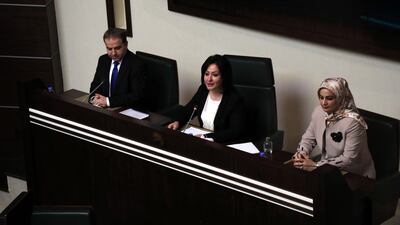Iraqi Kurdish politicians elected an interim speaker of parliament late on Monday to end months of political deadlock in government.
Vala Fareed, nominated by the Kurdistan Democratic Party (KDP), was chosen during the first parliamentary session since a highly contested legislative election in September.
She becomes the first female speaker in Iraq’s semi-autonomous Kurdish region.
Ms Fareed, 43, gained 68 votes but the session was boycotted by politicians from the Patriotic Union of Kurdistan, the party of former Iraqi President Jalal Talabani.
"Without a signed political agreement between us, we will neither participate in the parliamentary session nor the government formation process," PUK spokesman Latif Sheikh Omar said on Monday.
Ms Fareed will be appointed "temporarily" until a deal can be reached with the PUK on a permanent appointment, head of the KDP bloc Haimim Hamrami said.
Born in Erbil, Ms Fareed who has a law degree, was elected in parliament after the September poll.
Mona Kahveci, a female lawmaker from the Turkmen Reform Party, was elected as second deputy speaker.
Ms Kahveci became the first member from a non-Kurdish background to hold a senior post in the Kurdish government.
September's parliamentary election was the first in the Kurdish region since it experienced political infighting and a growing ISIS threat.
Iraq's Kurdistan region is divided into areas controlled by the two ruling parties. Yet, parliament has been largely paralysed since 2015 following a dispute over then President Masoud Barzani seeking an extension of his term, while both parties embraced a failed referendum on independence in 2017.
The deadlock in parliament set off a fierce battle between the KDP and the PUK for control over the government.
The two dynastic political parties fought a civil war in the 1990s but have more recently shared power. They were in a gruelling political battle in Baghdad, where they competed for the presidency at the federal level. The PUK came out on top with the election of Barham Salih.
The September elections marked the first time Kurds went to the polls after their push for independence.
Since then the region has faced political turmoil.
Even though 94 per cent of the voters were in favour of secession, the referendum failed to gain international and regional support.
The vote backfired after it was rejected by Baghdad, Washington and other international powers.
Iraqi forces took back oil-rich regions from Kurdish control and imposed economic sanctions that damaged relations between Baghdad and Erbil.
The move also reduced the Kurdistan Region's Government's share of the national budget.
Relations since then have slightly improved, despite continuous disagreements over oil exports.


